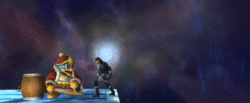Punishment: Difference between revisions
No edit summary |
Dinodomain (talk | contribs) (more situations, fixing large appositive in first sentence) |
||
| Line 1: | Line 1: | ||
{{ArticleIcons|series=y}} | {{ArticleIcons|series=y}} | ||
[[File:Punishment Snake F-air Lag KO Brawl.gif|thumb|right|250px|An example of a punishment. The landing lag produced by {{SSBB|Snake}}'s [[forward aerial]] gives enough time for {{SSBB|King Dedede}} to connect his [[dash attack]].]] | [[File:Punishment Snake F-air Lag KO Brawl.gif|thumb|right|250px|An example of a punishment. The landing lag produced by {{SSBB|Snake}}'s [[forward aerial]] gives enough time for {{SSBB|King Dedede}} to connect his [[dash attack]].]] | ||
'''Punishment''' is the act of attacking an opponent while they are vulnerable | '''Punishment''' is the act of attacking an opponent while they are vulnerable. Being vulnerable to be punished often results from using an attack with slow start-up lag at a non-opportune time or having missed an attack with high ending lag. For example, the [[Falcon Punch]] is a punishable move since it has long start-up and ending lag; if Captain Falcon uses it against an active and expecting opponent or if the move's target is able to avoid the attack, they have ample time to launch a counterattack. Characters can also be punished if their attack is [[shield]]ed, such as via [[shield grab]]bing or [[Out of Shield|out of shield]] attacks. An attack that is difficult to punish is usually known as "safe", usually due to having low ending lag and/or large hitboxes that are difficult to get around. A move's power can make punishment seem more dangerous; some players may choose to avoid the forward smashes of {{SSBB|Ike}} and {{SSBB|King Dedede}} rather than attempt to punish them simply because of the risk involved. Actions that are less subtle are often punishable as well. | ||
Some characters can use attacks with [[super armor]] for a unique kind of punish: for example, [[Warlock Punch]] in ''Smash 4'' can punish a bad attacking decision (such as an edge attack) due to its super armor while charging, while {{SSB4|Little Mac}}'s smash attacks all provide enough super armor for him to punish any sort of laggy attack, weak or strong, by simply plowing through it. | Some characters can use attacks with [[super armor]] for a unique kind of punish: for example, [[Warlock Punch]] in ''Smash 4'' can punish a bad attacking decision (such as an edge attack) due to its super armor while charging, while {{SSB4|Little Mac}}'s smash attacks all provide enough super armor for him to punish any sort of laggy attack, weak or strong, by simply plowing through it. | ||
Characters can also be punished if they have used a move that causes [[helplessness]], or they are in a position where their only [[recovery]] option is obvious and predictable. | Characters can also be punished if they have used a move that causes [[helplessness]], or they are in a position where their only [[recovery]] option is obvious and predictable. | ||
[[Crouch cancelling]] can lead to punishes, usually by using character's [[down smash]] or [[down tilt]]. | |||
[[Category:Gameplay]] | [[Category:Gameplay]] | ||
{{AllGames|Techniques}} | {{AllGames|Techniques}} | ||
Revision as of 02:47, November 14, 2016

Punishment is the act of attacking an opponent while they are vulnerable. Being vulnerable to be punished often results from using an attack with slow start-up lag at a non-opportune time or having missed an attack with high ending lag. For example, the Falcon Punch is a punishable move since it has long start-up and ending lag; if Captain Falcon uses it against an active and expecting opponent or if the move's target is able to avoid the attack, they have ample time to launch a counterattack. Characters can also be punished if their attack is shielded, such as via shield grabbing or out of shield attacks. An attack that is difficult to punish is usually known as "safe", usually due to having low ending lag and/or large hitboxes that are difficult to get around. A move's power can make punishment seem more dangerous; some players may choose to avoid the forward smashes of Ike and King Dedede rather than attempt to punish them simply because of the risk involved. Actions that are less subtle are often punishable as well.
Some characters can use attacks with super armor for a unique kind of punish: for example, Warlock Punch in Smash 4 can punish a bad attacking decision (such as an edge attack) due to its super armor while charging, while Little Mac's smash attacks all provide enough super armor for him to punish any sort of laggy attack, weak or strong, by simply plowing through it.
Characters can also be punished if they have used a move that causes helplessness, or they are in a position where their only recovery option is obvious and predictable.
Crouch cancelling can lead to punishes, usually by using character's down smash or down tilt.